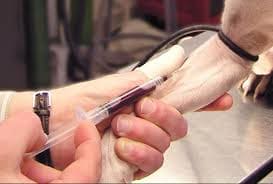Rocky’s Viewpoint

We all get the card or the email, yearly. It’s the reminder from our vet that our dog needs to get his annual vaccine boosters. We are instructed to book our appointment with the vet because of the importance of yearly vaccines to protect against dangerous diseases.
But is that really true? Is there another way to verify that your dog is protected?

It is a blood test that measures the level of antibodies in your dog’s body to determine if the dog has enough immunity against a particular disease.
Titers are usually expressed as a ratio; if the number is high, it means your dog has enough antibodies so his immune system will be able to fight off an attack of the disease should he be exposed to it. Antibodies come from either previous vaccination against the disease, or because a dog had the disease in the past. But in either case, a high titer means your dog is protected. If the test shows a low titer, your dog may not have immunity, so a revaccination is in order.
Studies show that 92 to 98% of dogs and cats that have been properly vaccinated have enough antibodies in their system to protect them for 7 to 9 years.
Also, yearly vaccination can result in over vaccinating, or vaccinosis, and can be a serious issue with many animals. Over vaccinating has been blamed for a myriad of major health concerns related to vaccine side effects, such as vaccine related illnesses, allergic reactions, and even vaccine site cancers.
Older dogs especially, may be much more susceptible to the ill effects of vaccinosis. And dogs who have any kind of immune system compromise often can’t get vaccinated at all because of the danger involved.
Even healthy dogs, once they have received all their puppy inoculations and their one year booster, very likely don’t need further boosters year after year.
My dog Yankee turned 9 in October. He had all his puppy vaccines followed by a booster when he was a year old. The next time I gave him a distemper/parvo vaccine was when he turned 7. And he’ll never have another one.
Instead, I do titer tests to ensure immunity against distemper and parvovirus. Titer testing can be more expensive than giving a vaccine, but to me it’s worth it to not subject my beloved dog to something that can possibly harm him.
I still give Yankee a rabies vaccine because it’s required by law, but I do it every 3 years. I also give him a yearly intra-nasal Bordatella because he comes to work with me and is around other dogs. When he was younger and I didn’t own a boarding/daycare facility, I didn’t give him the Bordatella vaccine at all . And I have never given him canine influenza, leptospirosis, or other vaccines, since there’s no evidence that there’s a problem in my area.
The American Animal Hospital Association guidelines say that titer testing is an effective way to check for immunity against parvovirus, distemper, and adenovirus.
It is not recommended for kennel cough, leptospirosis or Lyme disease because the vaccines only provide short term protection. And because rabies is required by law, no state will accept a titer, even though the titer test for rabies is a very accurate measurement of immunity.

That depends on you and your dog. While I firmly believe in a yearly examination by your vet, I don’t believe in yearly vaccinations.
You need to decide your comfort level with vaccinating versus doing a titer test. And if you need to board your dog, rest assured that Rocky’s Retreat will accept titer tests as proof of vaccination. I don’t know if this is true with other facilities. If titer testing is something you want to pursue, discuss it with your vet.
I for one don’t want to put anything unnecessary in my dog’s body. Golden retrievers are very susceptible to cancer, and I want to do whatever I can to help prevent Yankee from getting it. Titer testing is one of my choices for doing so.